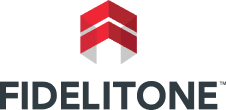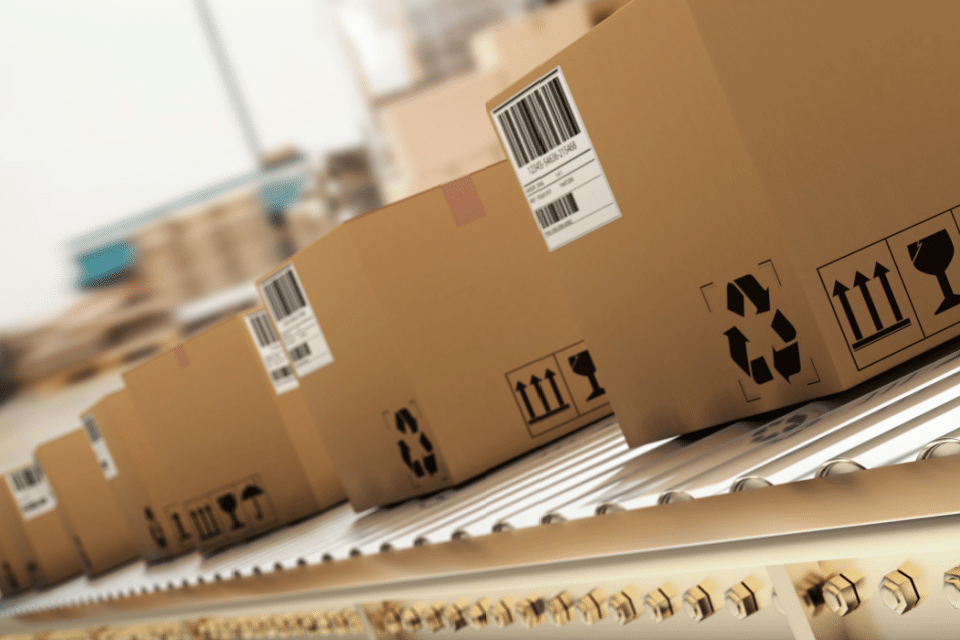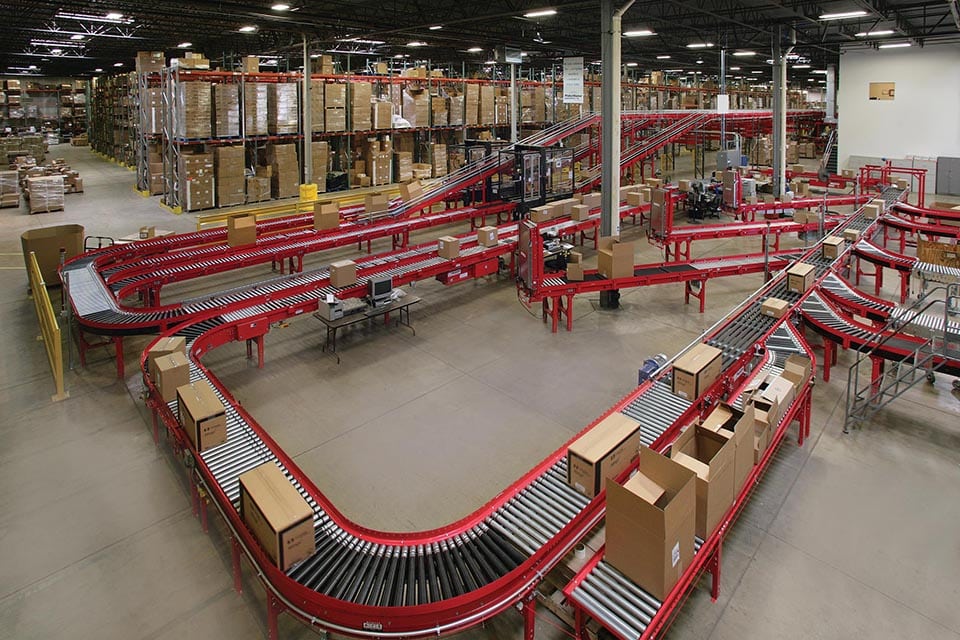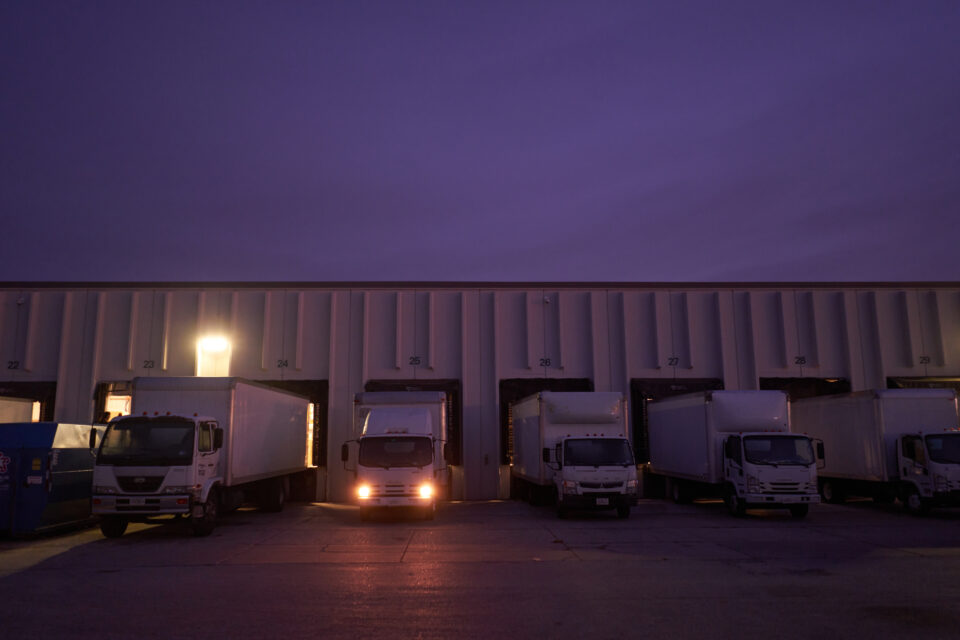Techniques for Boosting Service Levels in Parts

If you manage or oversee a spare parts distribution business — in particular, for consumer products with long lifecycles — you know that demand for these parts can be very difficult to forecast. You’re likely dealing with low volume parts, intermittent demand and many (too many?) items to stock. High fill rates can be difficult to achieve, which means service levels can suffer. A one-size-fits-all forecasting approach won’t work in this uniquely complex environment.
Making Customers Happy
Service levels are about getting the parts out the door and to the customer. Parts that are in stock — whether on the truck, in the service center or at the store — help ensure a product is repaired to a functioning condition (or enhanced, via a new accessory) within a meaningful timeframe. Parts that aren’t in stock need to be procured, which could cause delayed repairs, lost sales and a ding to overall satisfaction.
“In order to achieve optimal service levels, such as 95 percent or better,” says Tom Giovingo, Senior Vice President at FIDELITONE, “you need to have the right product on site. When it comes to service and repair parts inventories, you can create optimal levels of the right product, and do it profitably.”
At FIDELITONE, our forecasting approach focuses on inventory control — that is, increasing service levels while reducing inventory levels. We apply proven parts forecasting techniques and deliver them as a service, to help clients determine what to stock, when to stock and how much to stock.
Is Your Forecasting Working?
When planning for demand, keep in mind that not all service orders require parts. Typically, 40 percent will need them. The other 60 percent of service orders deal with adjustments, setup or education about the product.
What are some red flags that might be signaling to you that your current approach is not working?
- You run out of stock too often
- You have too much (or too little) inventory — for too many products
- You experience low inventory turns
Also, do you have a high back order rate? What percentage of your back orders result in cancellations? Back orders can lead to lost sales and higher costs, as you likely will have to make multiple shipments and pay for extra or expedited freight.
Here are a few tips from our forecasting experts:
- Focus on achieving high fill rates and low inventory levels. Your forecasting approach should help you meet service levels while containing costs. While service levels are measured differently across industries or organizations, generally speaking, you’re looking at a key performance indicator (KPI) that measures the amount of items in inventory versus how many are not. The percentage is represented in a fill rate and stock out rate.
- Poor fill rates will erode your customer base over time. By pinpointing a target fill rate (e.g., 95 to 99 percent), you can create conditions for higher customer retention.
- Stay on top of vendor lead times. Service parts businesses often deal with large, geographically dispersed vendor networks. You don’t want to run out of stock with a part that comes from, say, China and needs to arrive through the busy port of Long Beach.
- Avoid under-ordering during peak season. Manage fluctuations in customer demand by reviewing stocking levels and reorder points weekly.
- Older products create a higher level of risk, in terms of obsolescence. Typically, 80 percent of obsolete parts originate from older products. The other 20 percent come from new changes that eventually become old. Reduce your risk by holding the right amount of the right inventory.
Forecasting as a Service
If you’re looking for a solution to help improve your parts inventory forecasting and fulfillment performance, you’ll likely discover that a variety of options are available. Typically, these options fall within a forecasting service or a software tool.
FIDELITONE offers forecasting as a service, which means we provide the systems, infrastructure, equipment and expertise to help you reduce your parts inventory and generate higher fill rates. You get access to experts who understand parts forecasting and service parts management.
Service or software — which should you choose? Here are some things to consider to help you decide:
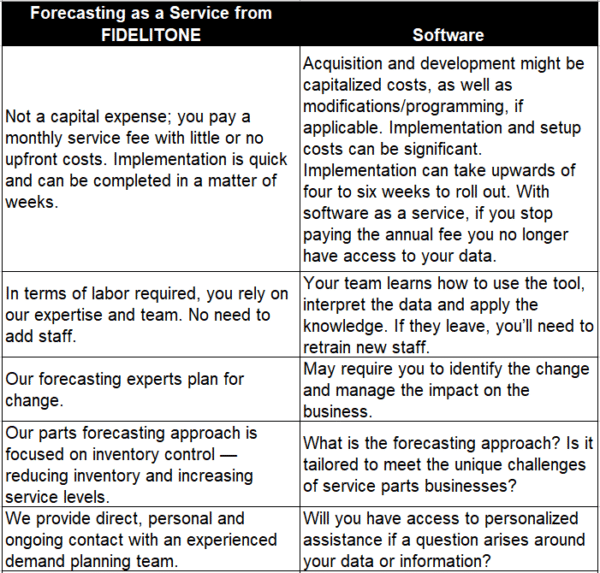
Want to learn more? Download our free white paper, “Extracting Higher Profits in After Sales.”
FIDELITONE helps you earn customers’ loyalty through specialized services in inbound logistics, order fulfillment, last mile delivery and service parts management.
